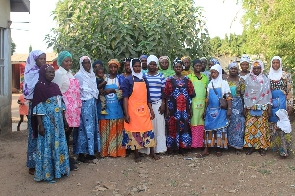The Shea Network Ghana (SNG), an organisation of Shea Sector Businesses, Stakeholders and Actors in the Shea Value Chain, has trained selected women on the valorization of the Shea biomass as part of efforts to improve economic growth for women entrepreneurs.
The women numbering 40, were selected from communities in the Northern, savanna, Upper East and Upper West regions where the SNG and its partners work.
These communities include: Salankpang and Kpulgine in the Mion District of the Northern Region, Kananto and Larabanga in West Gonja District of the Savanna Region, Kpatia and Gbellingivus in the Garu District of the Upper East Region and Jawia and Sorbelle in the Sissala West District of the Upper West Region.
The 40 women were trained to serve as Trainer of Trainees (ToT) for other women in their communities in the area of adding value to the Shea leftovers such as using them for making different types of soaps.
They were also trained on how to use the Shea leftovers in preparing fires by adding other materials in place of firewood.
The four-day- training took place at the Rita Damps Ventures from Tuesday, December 13, to Friday, December 16, 2022, in Tamale.
It was part of the implementation of the Women's Economic Advancement for Collective Transformation (WEACT), a five-year project implemented by the Shea Network Ghana and 5 other NGOs, supervised by OXFAM and funded by Global Affairs Canada.
Women face many complex barriers to their economic empowerment, such as prohibitive social norms, restricted access to productive resources, patriarchal structures, the traditional vision of labour at the household level and lack of education.
The situation is even more serious for women in Shea and cocoa areas as women who are the main actors in the value chains cannot rip the full benefits of their labour.
WEACT, therefore, seeks to change the narrative by adopting multiple entry points individual, collective, formal and informal to address these barriers.
In an interview with the media, the WEACT Project Manager at the SNG, Ubaidatu Iddrisu, said the Project sought to increase access to economic opportunities by implementing a gender-responsive skills development programme focused on transformative leadership, business acumen and negotiation skills; as well as providing technical and financial assistance for women to develop alternative livelihoods.
She also said the project aimed at improving the ability of women to individually and collectively overcome legal and social barriers to their participation in agriculture and economic activities.
"WEACT seeks among others, to enhance equal access to productive resources for women by using a multi-stakeholder social lab approach," she stated.
She indicated that the 40 women were leaders of women cooperatives businesses in the value chain who are expected to impact the same knowledge to their members, and thanked OXFAM Ghana and Global Affairs Canada for their support.
The WEACT Manager explained that SNG was an organisation of Shea Sector Businesses and actors that seek to influence policy and provide solutions to industrywide challenges for the overall growth of the shea sector in a coordinated manner.
She further noted that the SNG as an organisation, provides platforms for actors in the shea value chain to share industry experiences and knowledge, facilitate synergy and promote shea usage, develop opportunities for stakeholders and share benefits for all.
And urged the women to make the skills and knowledge they have gained useful to themselves and their communities by sharing it with their colleagues to also benefit.
Some of the beneficiaries in an interview with the media that Shea Network Ghana and its partners for the support and pledged to transfer what they have learned to their members and their communities to improve their economic lives.
"I didn't know that after getting my shea butter from the shea, I could use the leftovers to do many things like animal feed, firewood, and construction, but through this training, I got to know them," a participant said.
"We have learned a lot from the training, for instance, we learned how to mix the leftovers with fish and other ingredients as feed for animals, and also how to mix it with other materials and use it in place of firewood" another beneficiary stated.
Regional News of Wednesday, 21 December 2022
Source: Adam Abdul-Fatawu Wunizoya, Contributor

















